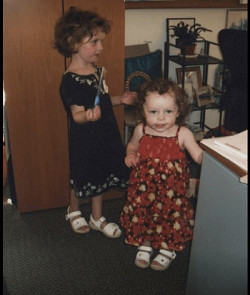Today's article comes courtesy of Doria Lavagnino, co-founder of CentSai.com, an educational website that looks to teach personal finance through storytelling.
As our kids are getting older, I've always wondered how we could best juggle our careers and their needs.
When I was working at Northrop Grumman, I remember one of the executives left his daughter's wedding to attend a leadership retreat to give us a kickoff talk about careers and career growth. He literally left the wedding reception just to talk to a bunch of new employees. Some marveled at his dedication but I thought it was sad.
I know balancing work and family can be difficult but I never want to be so far out of whack that I would even consider making that choice.
Which is why I was thrilled with Doria agreed to write an anecdotal recap of how she's balanced her career with her daughters.
This is part retrospective journal with my shoehorning of subheadings to give it a little prescriptive feel, but it shows how difficult it is to juggle family and career… but I hope you can take away a few ideas to apply in your life.
Let me start by saying that this is not going to be an article about how I knew I wanted children or aspired to find a career to keep me at home. I greatly admire women who do this. I am not one of them.
I also suspect any working mom who says she has it all figured out. At best, I have some of it figured out after 15 years. Let me share my story and key take-aways.
My husband and I were on the fence for nine years before we had our first daughter. I looked at babies with an equal measure of adoration and terror.
The ones cooing in their strollers on the street tugged at my heartstrings; the ones screaming at the top of their lungs on plane rides, not so much. Superficial evaluation I know, but in my 20s, that was the extent of my thought process. Babies were something I could put off until my 30s. So I did.
I am a career-driven woman who, as a teen, saw the results of the ’80s “superwoman” who could supposedly have it all:
- a high-powered career;
- well-adjusted children;
- a fantastic marriage to boot,
- and all while looking fit and healthy wearing those pinstriped power suits with shoulder pads that made women look like football players, ready for the tackle.
Think Melanie Griffith in the movie Working Girl.
Any woman who actually managed to maintain the above schedule for any amount of time either slept very little, was stretched beyond measure, or was so busy running around like a chicken with her head cut off that she had no time to enjoy her life, IMHO.
That said, my biological clock started ticking in my 30s. (I always thought this was a patriarchal construct until it happened to me.) I was excited to bring a little one into the world, but I also had a full-time job at Glamour magazine. I loved my job, but also wanted to ensure I was not short-changing my child, or myself.
When I became pregnant in my 30s, I was earning about $70k a year in New York City, where there’s a high cost of living. I was faced with the economic dilemma many women face. After paying for a nanny, my transportation to and from work, and other necessities — my salary was a wash.
Not to mention that as a first-time mom, I felt some degree of guilt about having a child only to hand her off to a nanny during the day.
I was fortunate that I had a choice of whether I wanted to stay home, something many women don’t have today. My husband earned enough to support our family, regardless of my decision.
We spoke about what to do at length. We both knew — especially after my 12-week maternity leave — that I was at my best when I worked outside of the home. And I am a firm believer that a mother has to be at her best to give her all to her child(ren), whatever that means to her and her family.
After I returned to the office, for a few years, working was as much an exercise in professional development as anything. But you know what? My husband and I viewed it as an economic and emotional investment in me.
Imagine if I had tried to re-enter the media industry after 10 years. Impossible? No. But in that time, everything had gone digital. I would have had to learn how to write for social media, Google (sadly) and for mobile: a completely different sensibility from when I joined the industry as a glossy magazine editor.
We found someone who helped us with our children (number two came about three years later) who stayed with us for 12 years. She was a second mother figure. We worked as a team and my daughters love her.
As progressive as we want to believe the world is, a stark reality exists. Taking years off from the job market puts women at an indisputable economic disadvantage. They lose the experience they would have gained, they are competing against men and women who did not take time off, and they have to make up for lost time and skills.
So, what have I learned?
Stay Relevant
If you want to remain relevant in the job market, you need to stay in touch — either through working for yourself at home, re-entering the workforce soon, or ensuring that you keep up with industry standards and training in your field.
Find Family Friendly Employers
If you work for an employer, I recommend finding one that supports family-friendly policies. While I was at Condé Nast from 2001 to 2010, part of their benefits package was 20 days a year of quality emergency child care with a company on a floor of my building.

My children loved coming to work with mommy, and knowing I could step away to have lunch with them was invaluable.
I challenge large companies to spend less on CEO salaries and bonuses and invest in childcare for the women and men who work for them. I guarantee this would result in greater productivity across the board, more women in senior and executive positions, and less sick days and churn for both genders.
Find companies where it’s accepted that men take paternity leave too. (And marry a man that doesn’t find the idea of sharing in childcare responsibilities somehow emasculating.) That can take care of the first six months of your child’s life, providing you can make the economics work.
Know Your Worth
If you don’t work for a big company, know your worth, and don’t be afraid to negotiate.
Maybe you want the flexibility to work two days from home.
Are you going to run into people in your office who feel like you are getting preferential treatment? Sure — there are always going to be haters. Get your work done on time, and don’t make excuses. Shouldn’t they be getting their work done?
Find and Nurture Supportive Minds
Some days will suck. You will have a bad day at work, you children will take you for granted, and you will question it all. Tomorrow is a new day.
Find like-minded women and men. I am lucky to have supportive friends of both genders. We help each other problem-solve, often while taking a brisk walk, to get some exercise in.
It's a Work in Progress
For full disclosure, over time my marriage did not work out, but my girls’ dad and I live five blocks from each other and speak daily about our children while respecting each other’s career goals and personal lives.
Quality over quantity. My children and I have certain rituals. Some include supporting my younger daughter’s entrepreneurial drive and helping her set up a cat-sitting business. My eldest loves musical theater and performs. I am actively involved in their interests, as is their father. We also take a one-week trip just the three of us every August. It’s our girl time.
Stop toxic gender and sexuality stereotyping. If a child is loved and thriving, that’s what matters. I hear lots of judgment about what constitutes a family. Just stop.
Set aside time with each child. I was an only child, so I had no idea about sibling rivalry. Each of my daughters need me, but in different ways and at different times. And it’s always changing. Expect that the minute you have a stage figured out, your child will find a new way to challenge you.
Family First
With all this said, I am still finding my way 15 years later. On the professional side, I pivoted my career and left my cushy editor job to dive into entrepreneurship. Part of that decision was to have greater control over my time and my destiny.
My children come first. If they need me during the day I am there, and I work at night or on weekends to make up for it.
Try to eat dinner together. Sounds simple but with multiple busy schedules it can be a challenge. That said, I learn more about what is going on in my daughters’ lives during these informal times than I would otherwise.
As co-founder and president of a financial literacy startup, I have a lot to manage. Sometimes I feel overwhelmed. Other times I feel slightly resentful when I hear colleagues complaining about their workload, yet they leave at 6, have no kids, and maintain exceedingly active social lives.
The one area where I need to improve is making time for myself. In 2013, I ran the NYC marathon to prove I could do it as a 40-something woman. I do need to reignite a personal goal or passion that is just for me. That, and exercise and meditation. Om.
Otherwise, despite the chaos, which I have learned to embrace, I consider myself pretty damn blessed, both personally and professionally.
I would love to hear how other moms and dads are making it work.



